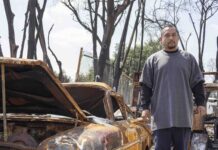You see them racing to class, zipping through the heavy traffic of the Campus Mall with roller backpacks trailing behind. They catch the front row seat and conquer it, unzip their bags and unload an arsenal of supplies atop their desks. International students are seemingly always on time and know the answers before the teacher asks questions.
It is a class that you likely paid $20 a unit for the class you’re sitting in, or nothing at all due to financial aid.
Perhaps it was the process to get to America from wherever in the world they came from. Maybe it is a difference in culture. Or, it could be the $183 they pay per unit.
Money has a funny way of inciting a strong work ethic, but for many of these students their dedication stems from sheer joy to learn with no restraints.
Huma Rahimi, was not used to it at first: the outspoken classmates, the teachers who happily banter back-and-forth with students, people leaving during a lecture to go the bathroom. The informality of it all surprised her.
In Afghanistan, her country of origin, and Pakistan, where she moved to at a young age, she was expected to remain silent and only to stand when the teacher entered the room.
Huma has met a lot of nice people in Pierce College classrooms; on the other hand, people are not perfect.
“Just by listening to others I realized that there are bad people here too,” Rahimi said. “I got the understanding that not everyone is the same.”
Not everyone is as kind as the stranger she bumped into at a U.S. embassy in Pakistan. The woman she met was knowledgeable with the Feminist Majority Foundation that eventually sent Huma packing for the United States in conjunction with the Los Angeles Community College District for a free education.
“I’ve been through some things, I don’t want to talk about it because it’s too hard to talk about,” Huma said.
The Feminist Majority Foundation knew the story that Huma cannot bare to retell; it was the same story that made her a unique international student as a recipient of political asylum and of a scholarship from the foundation.
In the fall, Huma will attend Cal State University, Northridge, yet another big move in Huma’s life. Now, in her political science classes Huma raises her hand fervently and is ready to speak.
THE PROGRAM
A makeshift waiting room for the Health Center leads you right to the front door of the International Students Program where Huma works.
Flags from all around the world hang from the T-bar grids on the ceiling and droop down to the windows alongside plastic blow-up globes. The program has been at Pierce for more than 50 years, according to Victoria van Tamelen-Hall, the director of the international students program.
Huma sifts through paperwork for an Iranian student who waits patiently for a packet about his tuition fees and F-1 visas. She scuffles through a pile of papers illuminated by the computer screen that flashes photos of her 7-month-old son; the same photos she sent to her husband in Sweden.
As she explains Pierce College’s application process to the young man quietly hovering over her, she warns him of the hefty bill at the end of the semester that his sponsor must be prepared to pay.
When students pass through the program, Huma and Tamelen-Hall strive to shed any extravagant ideas about living in Los Angeles. Internationals students on an F-1 student visa cannot work outside of campus unless they are under extraordinary financial circumstances and can only work on campus after a semester of full-time classes.
Some countries paint America as the iconographic scene of streets paved with gold. But, many students are getting a bit of a shock, especially after the recession, according to Tamelen-Hall.
“I think that when the students get here they become realistic about what America is,” Tamelen-Hall said. “Just getting back and forth without transportation can give them a significantly realistic view.”
For Huma, a culture shock was that money seemed to be everywhere – even on the streets.
“You can find things on the road,” she said. “You can find money on the road. I see pennies all the time and that’s money too.”
She often gets the urge to take the treasures others leave on their sidewalks. The refrigerator that needs a little tuning-up, the television set that can still tune in some stations and the furniture with barely-there stains could easily be used again, but Huma sees it as rude in American society.
“It’s unbelievable to see equipment on the streets,” Huma said. “They make money off of things like that in Pakistan. It would not be left alone.”
Out of the many students struggle with adjusting to American society, few come from English-speaking countries. The idea of a supermarket is unexciting to most students, but for many foreign students, the sprawling rows of food are inconceivable.
“A surprising amount of students did not expect Americans to be so introverted,” Tamelen-Hall said.
That day, a Swedish student came to her office for some moral support. She was upset that in America nobody seems to talk to each other.
“You’re paying all this money to go to class, you expect a lot from other people and they expect a lot from themselves,” Tamelen-Hall said. “Commitment doesn’t mean just having a dream. Their dreams are intertwined with their families who are expecting a lot of them from back home.”

()

()

()



